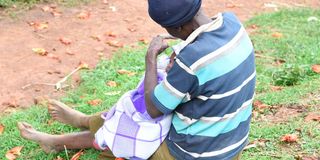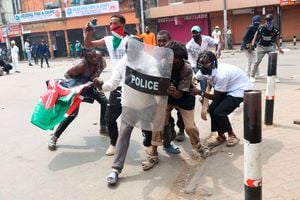'Can't you keep your legs together?' The ill treatment teen mums face in health facilities

A teenage mother with her baby. Disrespect and abuse during pregnancy and childbirth can have far-reaching consequences for teenage mothers and their babies.
What you need to know:
- A16-year-old faced harsh mistreatment from healthcare providers when seeking maternal care services as a pregnant teenager.
- Her traumatic experience, coupled with lack of support, led her to avoid prenatal visits.
- In Mathare, some pregnant teens prefer to be assisted to deliver by traditional birth attendants because they will be treated nicely.
- This highlights the disrespectful treatment and systemic barriers that many adolescent mothers encounter.
When Evy* was impregnated last year by an older man, she didn’t know seeking maternal healthcare services as a teenager would be a nightmare.
She was just a 16-year-old at the time. Her peers had pressured her to fit in their social group by finding a man to take care of her.
In a motorcycle taxi operator, she found one who even promised to marry her should she become pregnant. She says the man was probably in his 30s. A classic case of defilement under the Sexual Offences Act (2006)
Evy lived with her aunt in Mathare, a low-income settlement in Nairobi City County. She realised she was pregnant three months after the man took advantage of her.
“I was tired and nauseous for a long time. Then I missed my menses. It actually never crossed my mind that I would be pregnant,” says Evy.
“A friend who had pressured me to have the man as my boyfriend insisted I go for a check-up.”
Her friend was aged 17. Together they visited a public health facility in Mathare, where it was confirmed she was pregnant. The male nurse who attended to her advised her to start attending antenatal clinic (ANC) immediately.
The first ANC visit at the facility was horrifying, she says. The female nurse who received her was harsh, she says.
“She shouted at me ‘why do you girls go around sleeping with men?’ Can’t you keep your legs together? Who told you there will no men in Kenya by the time you become an adult?” remembers a teary Evy.
She says a male nurse came to her rescue.
“He told her to stop shouting at me. He was nice to me. He even gave me the mother-to-child booklet and showed me the date of the next visit,” she says.
“But I was already feeling like hiding somewhere far away. I didn't want to meet that nurse again. So, I never returned until the date of birth and I delivered my daughter without any complications.”
The defiler denied responsibility over the pregnancy, telling her “she is a prostitute who cannot tell the owner of the pregnancy.”
“I had hoped he would support me and even accompany me to the hospital. Instead he rejected me like a dog,” a bitter Evy says.
“My aunt was disappointed but at least she would remind me to go to hospital which I didn't for fear of being shouted at again.”
What the nurse did is subjecting Evy to violence that World Health Organisation says not only violates their right to respectful care, but can also threaten their rights to life, health, bodily integrity, and freedom from discrimination.
In its 2014 statement on prevention and elimination of disrespect and abuse during facility-based childbirth, WHO singled out adolescents as among categories of women more likely to experience disrespectful and abusive treatment than other women, which includes outright physical abuse, profound humiliation and verbal abuse, as well as coercive or unconsented medical procedures such as including sterilisation.
Inability to pay
Others forms of abuse are lack of confidentiality, failure to get fully informed consent, refusal to give pain medication, gross violations of privacy, and refusal of admission to health facilities.
In other cases, neglecting women during childbirth to suffer life-threatening, avoidable complications, and detention of women and their new-borns in facilities after childbirth due to an inability to pay is disrespectful treatment of women.
There is no universally adopted term for these kind of violence against women and girls during pregnancy and childbirth but some countries such as Venezuela, Argentina, Brazil, and Bolivia, which have a law call it obstetric violence.
However, some reproductive health practitioners say the term is a misnomer.
In a joint clinical opinion published in American Journal of Obstetrics and Gynaecology in March 2024, they argue that obstetric violence would be interpreted to mean a deliberate act of violence by healthcare providers when mistreatment can sometimes result from systemic issues, lack of training, or misunderstandings rather than intentional violence. They recommend obstetric mistreatment, instead.
Data on global prevalence of violence against women and girls during pregnancy and childbirth is scanty but in 2019 WHO released a report of a study in four countries showing that more than one-third of women experienced mistreatment during childbirth in health facilities.
The study, carried out in Ghana, Guinea, Myanmar and Nigeria found that women were at the highest risk of experiencing physical and verbal abuse between 30 minutes before birth until 15 minutes after birth.
In Kenya, until June 12, 2024, the Ministry of Health had not responded to my queries which asked about the prevalence, lack relevant of laws and policies, action taken against those who violated the women and teenagers as well as steps taken to prevent it altogether.
Mercy Kamau, a public health specialist, however, says such cases are rampant in public health hospitals.
“In Mathare, I’ve seen some (pregnant teens) preferring to be assisted to deliver by Japolo (traditional birth attendants) because they will be treated nicely,” she says.
WHO warns that the result of the violence, which keeps the women and girls away from the hospitals ends up increasing the mother and child mortality rates when they should be reducing.
Kenya hasn't achieved any significant decline in neonatal mortality rates.
According to Kenya Demographic and Health Survey, the rates dropped to 21 deaths per 1,000 live births in 2022 from 22 deaths per 1,000 live births in 2014.
A drop by only one death.
Sadly, neonatal deaths (relating to neonate-a child under 28 days of age), account for 66 per cent of infant deaths and 51 per cent of under-five deaths.
Teenagers’ situations are difficult that they can easily avoid ANC and postnatal visits crucial to saving their lives and that of their babies. WHO says, a child is at highest risk of dying during the first 28 days of their life.
Mercy points out the social complexities a pregnant teenager struggles with, which are further worsened by their unpleasant experience at the care of healthcare providers.
“Some girls have never been to school and yet they are given the mother-to-child booklet, which they can’t read. Return dates are written on them and since they can't read, they return on presumptive dates,” she says.
“We had one such girl and the nurses would scold her, and since she was so young, scared, and ashamed, she’d just keep quiet instead of telling them she can't read.”
Then there is the indifferent caregivers.
“Some caregivers are very unsupportive and when the girl goes to deliver she has nothing. Then the nurses are there rebuking her, ‘why did you not bring the baby’s clothes?’ Yet they don't know that these girls have totally nothing,” she says.
A nurse-in-charge of one of the public health facilities in Nairobi City County says while she can’t deny that such cases do happen, she doesn't agree to the accusation that the nurses abuse the teenagers on the grounds of being pregnant.
“Asking her (teenager) why she got pregnant too early is imposing your own values on the girls,” she notes.
She attributes occurrence of such bad treatment to “stress of burnout and workload.”
The nurse, however, indicated that public hospitals have youth-friendly clinics where teens who are pregnant or have delivered, are given priority when they visit.
Teenage pregnancy may have reduced to 15 per cent in 2022 from 18 per cent in 2014, going by KDHS data, but the sad reality sticks out; the 15 per cent are numbers of pregnant girls, and how they are treated at the hospitals would determine whether they and their babies will survive the pregnancy or childbirth.
“If we are treated like that, what choice do we have other than to abort then end up dying?” remarks Evy.
Evy is a given name to safeguard the privacy of the teenage mother.





